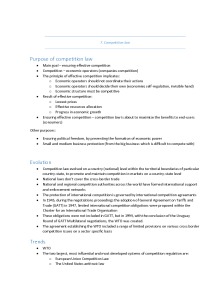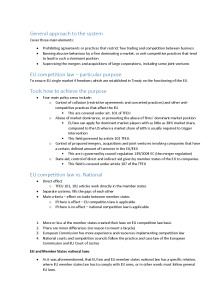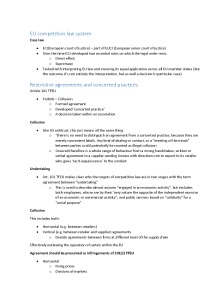International Business Law Conspectus



Purpose of competition law. Evolution. Trends. General approach to the system. EU competition law – particular purpose. Tools how to achieve the purpose. EU competition law vs. National. EU competition law system. Restrictive agreements and concerted practices. Abuse of dominant position. Concentration (mergers and acquisitions). Civil law. National civil law (as a law branch) system. Structure of a civil code. Book 1 – General provisions. Book 2. Persons. Book 4. Property law. Book 6. Law on obligations. Labour law. Collective labour relations. Individual employment relations. Labour law. International labour organization. Posted workers. Frontier workers. Case.
To ensure EU single market 4 freedoms which are established in Treaty on the functioning of the EU.
Abuse of market dominance, or preventing the abuse of firms’ dominant market position
This are is governed by council regulation 139/2004 EC (the merger regulation)
This field is covered under article 107 of the TFEU
TFEU 101, 102 articles work directly in the member states
If there is effect – EU competition law is applicable
There are minor differences (no reason to invent a bicycle)
National courts and competition councils follow the practice and case law of the European Commission and EU Court of Justice
As it was aforementioned, that EU law and EU member states national law has a specific relation, where EU member states law has to comply with EU ones, or in other words must follow general EU laws.
Abusive conduct is usually organized under different categories, from those in art. 102 and more
Civil law is a set of rules which govern civil relations. The system of a civil law is based on Civil code.
Intangible property (financial instruments (stocks, bonds), intellectual property (patents, copyrights, trademarks), digital files, communication channels, a certain forms of identifier(internet domain names, network address, handle and trademarks)
European convention on human rights. European states enshrined the right to protection on property in art 1 of Protocol I
305 There is no special article for cars, so you should use general rule for movable goods.
311 article directs to 1.71,72,73,74 >>> 1.74 says that there is no need for notary for sale of car.
1.93 and 1.72 it is not compulsory, but you cannot use witnesses later to prove ownership. (6.99)
6.318; 6.319 Between the contract is approved. John can’t register his ownership in the registry as there are no written contract. In theory, John is the owner, but technically he is not.
Mark is wondering what he can do, can he still sell and transfer to John?
6.165(4) Mark can terminate the preliminary contract, but he should pay a compensation to Sara.
She has to have a strong proof of damage. She cannot compel Mark to sign the contract.
If compensation is less than profits from selling to John, Mark should sell to John.
Was the contract concluded according to Lithuanian contract law (Use Lithuanian civil code art 6.162-6.189)
6.178 counter offer was made (call to the office) as the conditions of payment were asked to be changed.
Also if we take money transfer as acceptance, it is not right as nephew didn’t fulfil the condition of accepting fairly quickly. He should have informed uncle that he accepts before transferring the money.
1 variantas: 4.52(1) the risk of the damage of a thing being transferred is still in seller’s accountability, as according to 4.49(1) the ownership rights are transferred only after the thing is transferred. (reiktu surast dar straipsni apie pinigu grazinima ar kompensacija)












